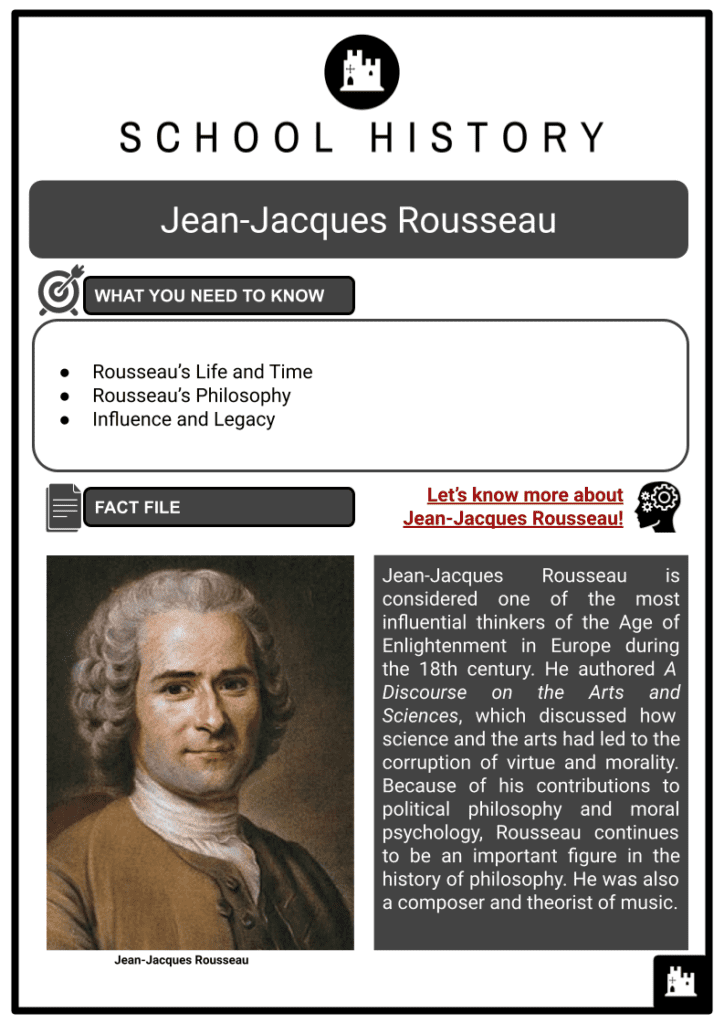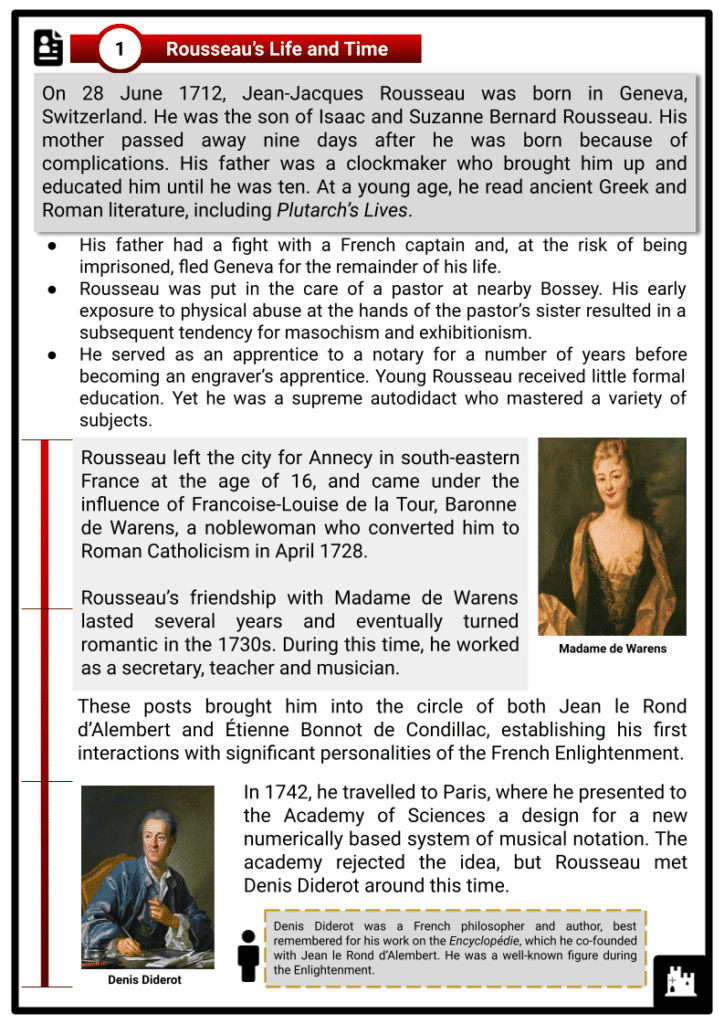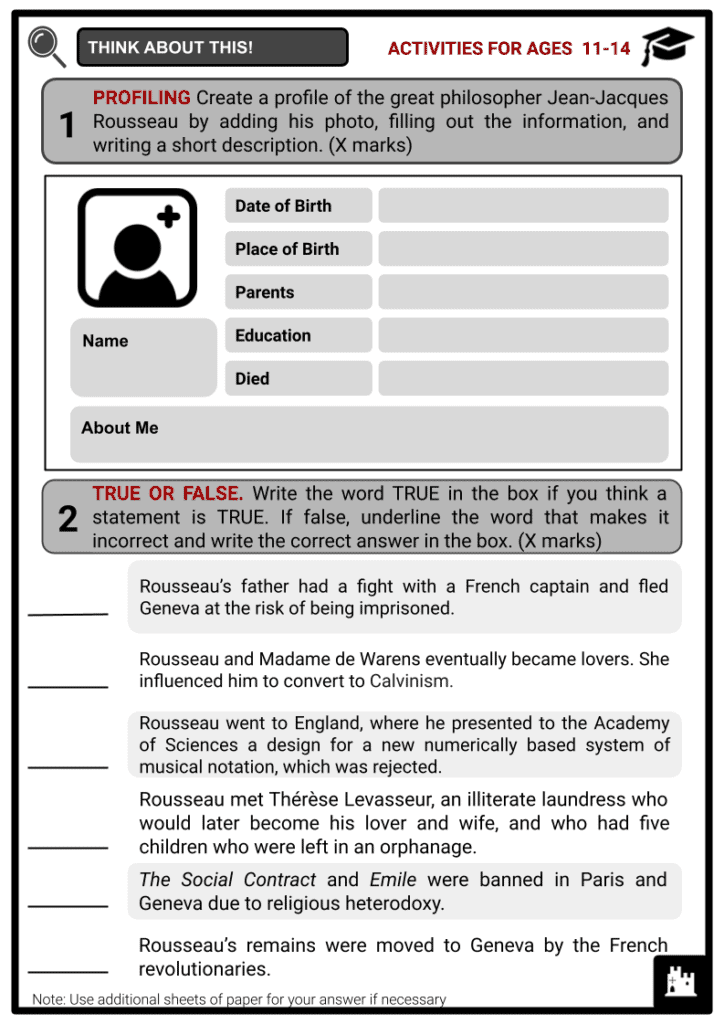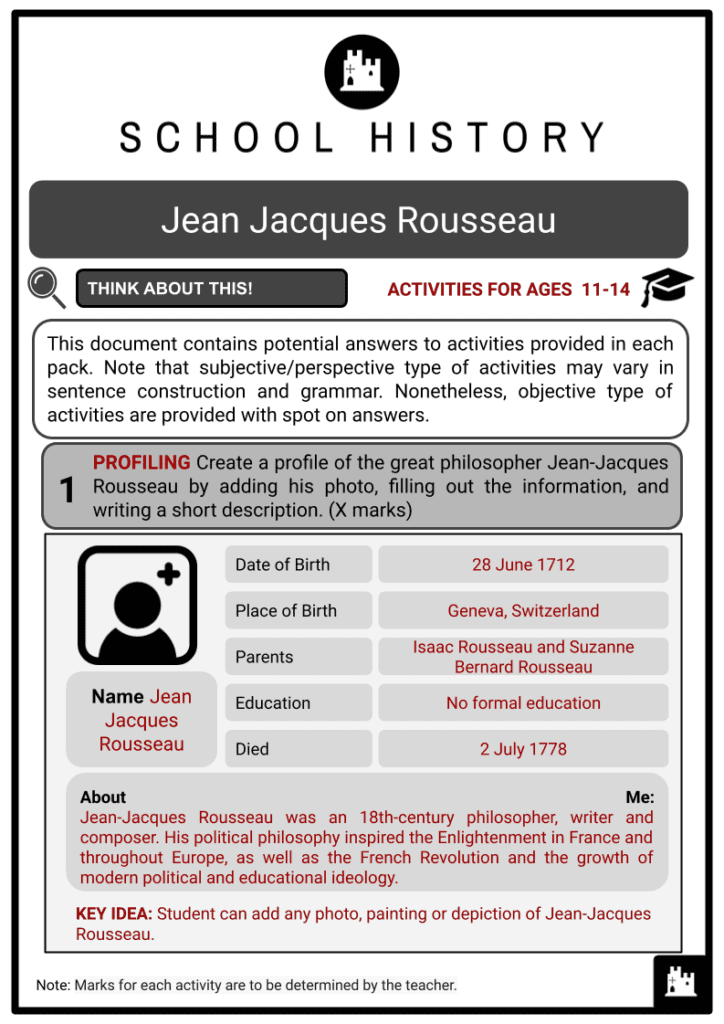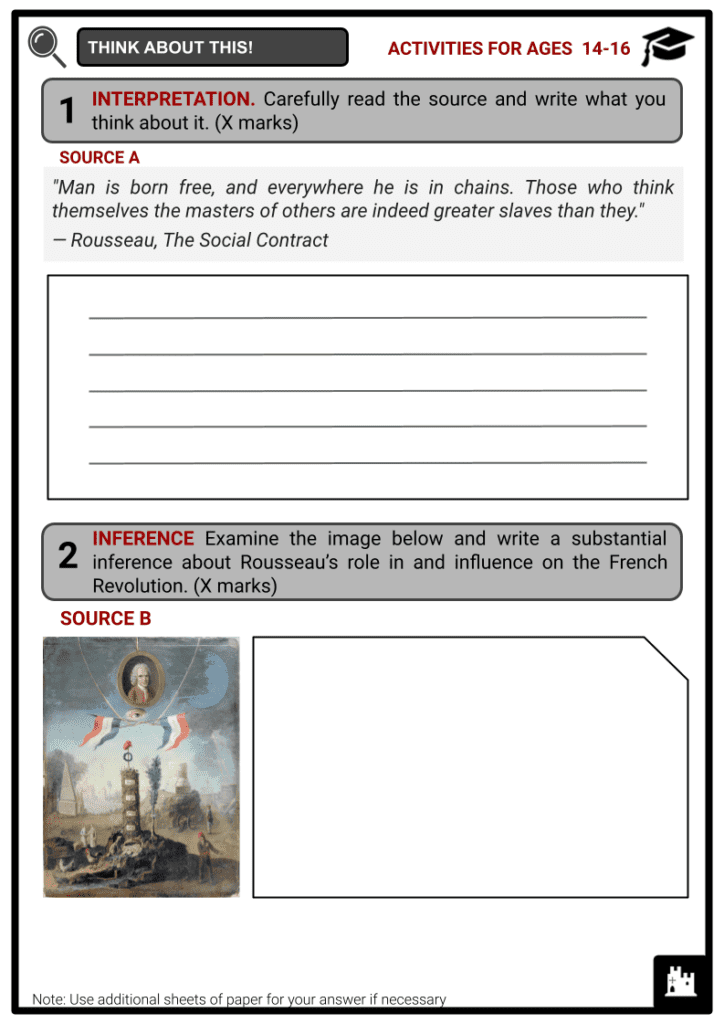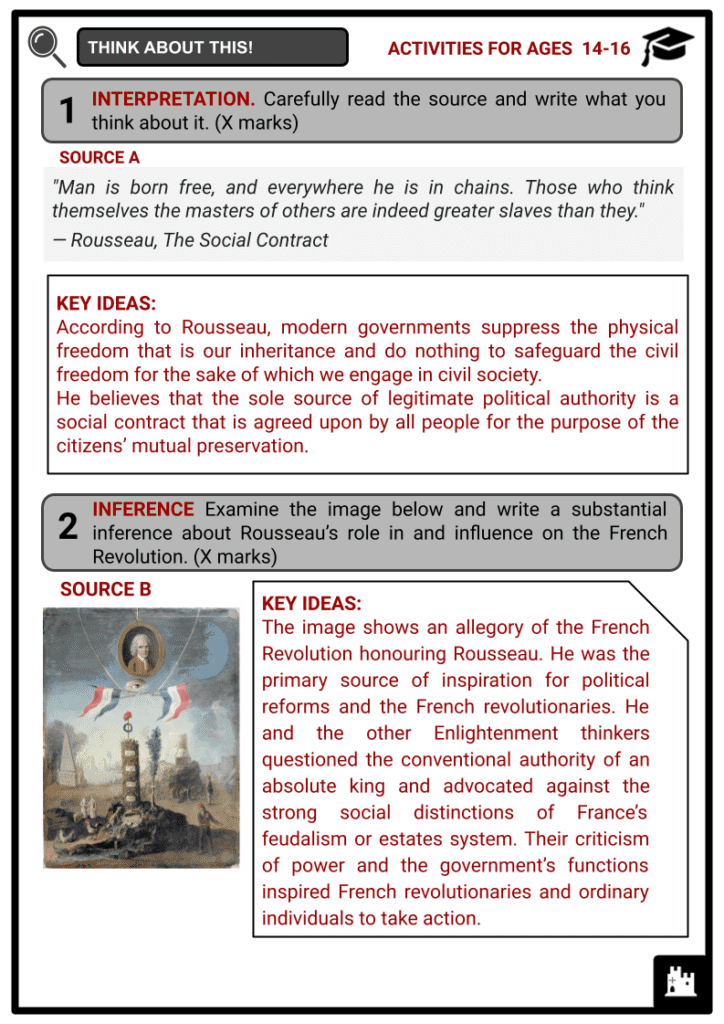Jean-Jacques Rousseau Worksheets
Do you want to save dozens of hours in time? Get your evenings and weekends back? Be able to teach about Jean-Jacques Rousseau to your students?
Our worksheet bundle includes a fact file and printable worksheets and student activities. Perfect for both the classroom and homeschooling!
Summary
- Rousseau’s Life and Time
- Rousseau’s Philosophy
- Influence and Legacy
Key Facts And Information
Let’s find out more about Jean-Jacques Rousseau!
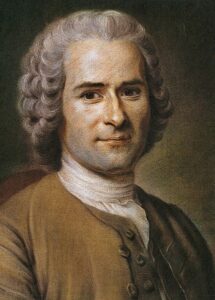
Jean-Jacques Rousseau is considered one of the most influential thinkers of the Age of Enlightenment in Europe during the 18th century. He authored A Discourse on the Arts and Sciences, which discussed how science and the arts had led to the corruption of virtue and morality. Because of his contributions to political philosophy and moral psychology, Rousseau continues to be an important figure in the history of philosophy. He was also a composer and theorist of music.
Rousseau’s Life and Time
- On 28 June 1712, Jean-Jacques Rousseau was born in Geneva, Switzerland. He was the son of Isaac and Suzanne Bernard Rousseau. His mother passed away nine days after he was born because of complications. His father was a clockmaker who brought him up and educated him until he was ten. At a young age, he read ancient Greek and Roman literature, including Plutarch’s Lives.
- His father had a fight with a French captain and, at the risk of being imprisoned, fled Geneva for the remainder of his life.
- Rousseau was put in the care of a pastor at nearby Bossey. His early exposure to physical abuse at the hands of the pastor’s sister resulted in a subsequent tendency for masochism and exhibitionism.
- He served as an apprentice to a notary for a number of years before becoming an engraver’s apprentice. Young Rousseau received little formal education. Yet he was a supreme autodidact who mastered a variety of subjects.
- Rousseau left the city for Annecy in south-eastern France at the age of 16, and came under the influence of Francoise-Louise de la Tour, Baronne de Warens, a noblewoman who converted him to Roman Catholicism in April 1728.
- Rousseau’s friendship with Madame de Warens lasted several years and eventually turned romantic in the 1730s. During this time, he worked as a secretary, teacher and musician.
- These posts brought him into the circle of both Jean le Rond d’Alembert and Étienne Bonnot de Condillac, establishing his first interactions with significant personalities of the French Enlightenment.
- In 1742, he travelled to Paris, where he presented to the Academy of Sciences a design for a new numerically based system of musical notation. The academy rejected the idea, but Rousseau met Denis Diderot around this time. Denis Diderot was a French philosopher and author, best remembered for his work on the Encyclopédie, which he co-founded with Jean le Rond d’Alembert. He was a well-known figure during the Enlightenment.
- In 1745, Rousseau met Thérèse Levasseur, an illiterate laundress who would later become his lover and wife. Thérèse gave birth to five children who were immediately left at an orphanage in Paris. Voltaire would later use the abandonment of Rousseau’s children against him.
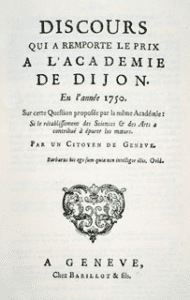
‘Discourse on the Arts and Sciences’ - In 1750, Rousseau joined the Academy of Dijon’s essay competition on whether the development of the arts and sciences enhanced or corrupted public morality. He published ‘Discourse on the Arts and Sciences’ (‘Discours sur les Sciences et les Arts’) which won the academy’s first prize and gained him significant fame. The central view is that people are naturally good but are corrupted by society. The work was controversial and widely read.
- In 1752, Rousseau made his most significant contributions to music. During this time, he wrote both the words and music of his opera, Le Devin du Village (The Village Soothsayer) which was performed for King Louis XV in 1753 and was an instant success.
- In 1755, Rousseau submitted another entry entitled ‘Discourse on the Origin of Inequality Among Men’ to the Academy of Dijon’s essay competition. However, he did not win. In his second discourse, Rousseau begins to develop his theories of human social development and moral psychology.
- In 1762, with the support of Mme d’Epinay and the Duke and Duchess of Luxembourg, he released two significant philosophical treatises: ‘The Social Contract’, the standard work on political philosophy, and Emile, a book outlining his views on education.
- Unfortunately, the release of these writings brought about his own downfall. On the basis of religious heterodoxy, Emile was banned in Paris, and ‘The Social Contract’ was also banned in Geneva, which forced him to flee France to avoid arrest.
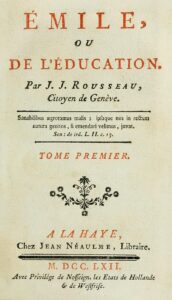
Emile, Or on Education - In 1764, he moved to Switzerland and began writing his autobiography, Confessions. After encountering troubles with Swiss authorities a year later, he spent time in Berlin and Paris before moving to England at David Hume’s invitation. The insight of Rousseau’s Confessions is that certain crucial experiences, which appear trivial to others, have a huge impact on the development of an individual’s personality. Rousseau believed that the most significant events are those that linger in a person’s memory but are difficult to comprehend. Because of this, they may conceal the most revealing information.
- Due to disagreements with Hume, his stay in England lasted only one year, and he anonymously returned to the south-east of France in 1767.
- In an effort to avoid partition by Prussia, Austria and Russia, he produced the remarkable Gouvernement de Pologne in 1772. The book combines intelligent constitutional reforms with Rousseau’s most glowing account of Spartan and Roman-republican civic virtue.
- In 1777, Rousseau penned his last great confessional work, The Reveries of a Solitary Walker, which begins with the famous phrase, ‘Here I am, then, alone on the Earth, no longer having any brother, neighbour, friend, or society other than myself.’
- On 2 July 1778, Rousseau passed away. In 1794, French revolutionary forces moved his remains to the Paris Panthéon.
Rousseau’s Philosophy
- Rousseau’s political philosophy has had a substantial impact. He was also among the most influential figures in the history of political philosophy, influencing later figures such as Karl Marx and the leaders of the French Revolution who supported his works.
- Moreover, Julie, or the New Heloise and The Reveries of the Solitary Walker played a significant role in his philosophy’s influence on the late 18th-century Romantic Naturalism movement in Europe.
- The Discourse on the Origin of Inequality is one of Rousseau’s most well-known works. It serves as the ground for much of his political philosophy, as expressed in the Discourse on Political Economy and Social Contract. Rousseau characterises the natural man as being alone, timid, peaceful, mute, and without the foresight to fret about the future.
- Ultimately, the work is founded on the belief that humans are fundamentally peaceful, content and equal. It is the process of socialisation that has produced inequality, competition, and a narcissistic mindset.
- Rousseau’s primary political philosophy is that a state can only be legitimate if it follows the ‘general will’ of its citizens. The Social Contract provides the most comprehensive explanation of this idea.
General Will and the Common Good
- According to Rousseau, general will is the will of the sovereign, or of all the people collectively, which seeks the common good – what is best for the state as a whole.
- Although each individual may have a unique will that represents what is best for him or her, in a healthy society where the collective benefit is prioritised over the individual good, the sum of all individual wills, the ‘will of all’, is equivalent to the general will.
Social Contract Theory
- The social contract was an agreement between free individuals to form a society, legislate, and establish a government.
- People surrendered certain liberties and self-interests to this government for the greater good.
- People in society must be governed due to the well-known truth that absolute freedom will result in nothing but disorder.
- As a result, the people agreed to give up some of their freedom in return for the preservation of their basic rights.
- In Rousseau’s view, the state must always protect the freedom and liberties of individuals.
Family
- Rousseau’s vision of the family, particularly regarding the roles of men and women, has proven to be an influential feature of his philosophy.
- Rousseau’s perspective on the nature of the interaction between men and women is based on the belief that males are stronger and hence more self-reliant. They only rely on women due to their yearning for them. In contrast, women require and want men.
- According to Rousseau, women are more intelligent than men and excel in practical subjects. These viewpoints are frequently discussed among feminist and Rousseau scholars.
Education
- The objective of Rousseau’s philosophy of education is to help students develop their character and moral sense so that they can learn to exercise self-control and remain moral even in the unnatural and flawed society in which they will have to live. This philosophy does not focus on specific methods of teaching information or concepts.
- Rousseau believed in the uniqueness of each personality. He encouraged teachers to instead bring out the exceptional skills of the individual, assisting pupils to think for themselves rather than simply reproduce memorised knowledge.
- His semi-novel Émile shows how a wise tutor guides the boy Émile through a sequence of experiences that lay the groundwork for lifetime learning and growth.
Human Nature
- Rousseau often asserts that one idea is at the core of his world view — that humans are good by nature but are corrupted by society.
- Rousseau distinguishes between two types of self-love: amour de soi and amour propre.
- Amour de soi
- Self-love that is independent of other people
- Naturally prioritising our own survival and interests
- Amour proper
- Vanity or pride
- A self-love that is unnatural and fundamentally relational. In other words, it results from how individuals perceive themselves in relation to other individuals.
- Amour de soi
Freedom
- Rousseau asserted that modern man’s enslavement to his own needs was responsible for a variety of societal problems, including exploitation, dominance, low self-esteem, and despair.
- Rousseau stated that the freedom of all citizens must be the primary purpose of a good government.
- He realised that as long as property and regulations exist, people will never be as utterly free in modern society since they are in the state of nature. Marx and numerous other communist and anarchist social philosophers also reiterated this idea.
Influence and Legacy
- Rousseau’s theories have had a great impact on later philosophers and political theorists, despite the fact that the tensions and ambiguities in his work have led to profoundly contradictory and different interpretations.
- Rousseau’s most significant influence in philosophy was on Immanuel Kant.
- Examples of direct influence include Kant’s concept of the categorical imperative, whose third formulation in the Groundwork of the Metaphysics of Morals recalls Rousseau’s discussion of the general will in The Social Contract.
- Immanuel Kant was a philosopher and one of the Enlightenment thinkers. The work of Kant relates to both the natural law and social contract traditions. Kant believed that every rational individual possessed both an inherent right to freedom and an obligation to enter into a civil condition defined by a social contract in order to accomplish and retain that freedom.
- Edmund Burke acknowledged Rousseau’s influence on the French Revolution in Reflections on the Revolution in France. This critique echoed throughout Europe, prompting Catherine the Great to suppress his books.
- This link between Rousseau and the French Revolution (particularly the Terror) continued for the following century. As Francois Furet argues, Rousseau was at the centre of understanding the French Revolution for both its supporters and critics for the entirety of the 19th century.
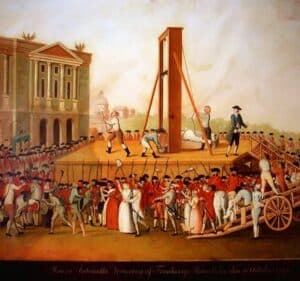
The Terror was a period of state-sanctioned violence and mass executions during the French Revolution. - The ideas and writings of Rousseau, such as The Social Contract, established the claim of all men to basic human rights.
- Rousseau’s thoughts on rights and Baron Montesquieu’s ideas on government became the basis of a radical French Revolution movement known as the Terror.
- During the Reign of Terror, the leaders Louis Antoine de Saint-Just and Maximilien Robespierre viewed themselves as egalitarian republicans obligated to eliminate corruption. Rousseau was their primary source of inspiration in this regard.
- Robespierre believed that the shortcomings of individuals could be remedied by maintaining the ‘common good’, which he defined as the collective desire of the people. He got this term from Rousseau’s General Will.
- According to Will and Ariel Durant, Rousseau had a significant impact on American politics. The initial indication of Rousseau’s political effect was a wave of public sympathy for active French assistance to the American Revolution.
- Rousseau published The Social Contract, Or Principles of Political Right in 1762, in which he explains that government is founded on the principle of popular sovereignty. The basic principle of this concept is that the state derives its power and direction from the collective will of the people.
- The concept of the social contract had a significant influence on the American Founding Fathers, particularly Thomas Jefferson. Thomas Jefferson drew inspiration for the Declaration of Independence from Rousseau, Locke and Montesquieu.
- As an ambassador to France from 1785 to 1789, he learned a great deal from both Voltaire and Rousseau. The success of the American Revolution enhanced Rousseau’s reputation as a philosopher.
- The American Revolution was an iconic political and military conflict that raged from 1765 to 1783 when the 13 British North American colonies rejected imperial rule. The protest arose in response to taxes collected by the British monarchy and Parliament without colonial representation.

